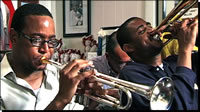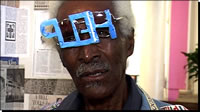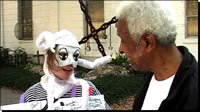An Interview with Peter Entell |
Conducted by Michael Pasquier |
Michael Pasquier (MP): Why did you choose to produce a film on a historically African American, Roman Catholic Church in New Orleans following Hurricane Katrina?
 |
Peter Entell (PE): I got a call from a friend of mine, a woman from St. Augustine Parish, who had evacuated New Orleans after Katrina. She returned to New Orleans about six months later, and it was at that time that the archdiocese decided to close the church and send away the pastor, Father LeDoux. She called me because she thought I could capture the story. She explained that things were about to heat up, and that I had three days to get there. I was living in Geneva, Switzerland, at the time, and I had no budget. I immediately thought to myself: I'm an American citizen, but I've lived in Europe for over thirty years; I've never made a film in the United States, mainly because I never had access to a story that touched me so much. There was something different about St. Augustine Parish. For me, filmmaking is very much a question of access, because I really want to get inside a story. I immediately left for New Orleans along with a cameraman, a sound engineer, and my original contact. So basically it was the four of us in New Orleans.
The story touched on so many things. It touched on questions of how power works, how people with power exercise power, and how those who don't have power learn to obtain power. It touched on questions of race, history, and economics. The situation also raised questions about faith. Is the faith of the parishioners being tested? How do they practice their faith? How does a church respond to the needs of the poor? How is it possible that an institution like the Catholic Church—an institution which should be helping those in need—chooses not to respond to the needs of its people? How can a church not be responsive to parishioners who are saying, "We need help"? And, to be perfectly honest, I still don't have an answer to that question. The film raises a lot of questions that need to be thought about and discussed. Perhaps there are no easy answers.
MP: The narrative of the film focuses on Father Jerome LeDoux, the pastor of St. Augustine Parish. He comes across as a rather charismatic figure. To what extent was he involved in the direction of the film and what were your impressions of him as a black Catholic leader?
PE: Fr. LeDoux is certainly a charismatic person. He stayed in New Orleans during and after the hurricane. The church building, which is very important to this story, is located on a little higher ground than the surrounding area, so the flood waters didn't rise higher than the sidewalk. However, flooding did occur in neighborhoods surrounding the church, especially in a neighborhood called Treme. So a lot of people did come to the church, and it became a makeshift place of refuge, and Fr. LeDoux welcomed them and cared for them.
In the film, Fr. LeDoux talks about post-traumatic stress, but he then describes it as post-Katrina stress, which is to say that suffering it still going on to this day. Many people died after the storm and many people are still dying prematurely because of the storm. Many people have just given up. Family members died, homes were destroyed, people lost their jobs, and sometimes it was difficult for people to go on. Over the course of filming for five weeks, Fr. LeDoux was involved in many funerals, sometimes three in one day. And when you watch the film, you notice that funerals pace the story. The film begins with a funeral.
 |
Fr. LeDoux's clothing and form of worship are significant. He says mass in African-styled robes, he breaks into singing during the liturgy, and he plays an active role in Mardi Gras. He also knows the history of St. Augustine, and he knows that his parishioners know the history too. He is very connected to his community, to his culture. So he's not just interested in sacraments and orthodox Catholicism. He is concerned with how to integrate the church into the community, into the lives of the parishioners. And it's obvious that the archdiocese doesn't care for some of these activities.
MP: Can you explain the relationship between officials of the Archdiocese of New Orleans and the parishioners of St. Augustine Parish? Did archdiocesan officials respond in any way to your filming of Shake the Devil Off?
PE: From the beginning, there was a lack of communication between Fr. LeDoux and the archdiocese. The archdiocese was not being clear about why they wanted to close St. Augustine. At one point, the archdiocese said that Fr. LeDoux was too old, that he was 75 years old and it was time to retire. But it's no secret that priests much older than Fr. LeDoux are still leading parishes; even the pope is older than Fr. LeDoux. It's also no secret that there is a shortage of priests in the United States. Certainly when you see Fr. LeDoux you notice that he is very healthy and vibrant. And besides, Fr. LeDoux is now serving a parish in Texas, so he was not forced into retirement. So basically the parishioners were very confused. I tried to have direct communication with the archbishop and his spokesmen, but did not receive a response. We tried nonetheless to include as much as we could of the archdiocese's position through the spokesman who was interviewed by CNN.
Other reasons for closing the parish came up, and they kept changing. At one point the archdiocese said that it was a matter of finances and that there weren't enough parishioners contributing enough money to the church. But here you have a situation where half of the city had not returned.
It was clear that the archdiocese did not like me filming. Fr. LeDoux was ordered not to speak with anyone about the circumstances of the case, so we never interviewed him. You will see people turn to the camera and speak directly to us, but this was not planned. It's what you might call cinema verité, or events as they unfold. I never told people what to do, we didn't use lights or give stage directions, all we did was film events as they unfolded. I never knew what we were going to do when we woke up in the morning. Sometimes there was advance notice of parish meetings and masses.
MP: You include the perspectives of many African American laypeople in Shake the Devil Off. To what extent did you notice parishioners combining civil rights activism with their Catholic convictions?
PE: The parishioners were keenly aware of their history. They were keenly aware of the fact that their ancestors were enslaved. A strong sense of freedom was very much integrated into people's attitudes. When Fr. LeDoux was sent away and when they felt the parish under threat, they did not want to sit back and let it happen. But you must understand that these people are very devout; their immediate response was to pray. They prayed for the archbishop and for the replacement pastor. They prayed that their needs would be understood. This was their initial reaction. Yet, at the same time, there was a plan B, and plan B was militancy. They felt that if it was necessary, they would take matters into their own hands. They knew that their prayers might need to be backed up by action, so they ultimately took over the rectory. They locked themselves in the rectory and occupied it until the archdiocese would hear their grievances.
 |
However, it must be said that St. Augustine Parish is made up of individuals; there was not one voice. There were different points of view. There was considerable discussion over the correct response to the archdiocese, and many people disagreed with the implementation of plan B. Ultimately, the archdiocese allowed Fr. LeDoux to return for Good Friday services, but he was quickly sent to Texas. Many parishioners today feel that they were tricked by the archdiocese. So, in the end, I think the film raises questions about prayer. Does God answer prayers? Do people answer their own prayers? How do people influence the will of God? The film doesn't answer these questions, but it does raise them.
MP: Music plays an important role in Shake the Devil Off. What do you make of the blending of African American and Roman Catholic cultures in the musical performances of parishioners?
PE: I call this film a musical. Music is very much a part of the culture of New Orleans, and especially the parish of St. Augustine. Many people say that this is the birthplace of jazz. There were great musicians who came to the church while we were there. Members of the Marsalis family played at the church, as did other musicians and bands like Mother Tongue, Deacon John Moore, Esquizito, Michael White, Glen David Andrews and the Treme Brass Brand. These are people who just wanted to help the parish. These are people who volunteered and who play regularly at the church. In a way, music plays a pivotal role in the life of the church. Many musicians generously allowed us to film them and include them in the film. Glen David Andrews is the central musician of the film. He is originally from the Treme neighborhood and is the storyteller who makes up lyrics as events move along.
MP: How have international audiences responded to the film?
PE: We screened the film in Montreal very early on, and there was a 5 minute standing ovation. Fr. LeDoux said he was so incredibly touched by the fact that people as far away as Montreal could respond in such a remarkable way. The story strikes a chord on so many levels. It raises questions about suffering and support. Many European audiences, and I'm sure American audiences as well, are very much aware of the fact that news agencies pick up a story and then drop it after the headlines are made. I think we were able to keep the story going in Shake the Devil Off.
MP: There is a tendency to characterize New Orleans as somehow different from the rest of the United States. After filming Shake the Devil Off, what do you make of the argument that New Orleans is unique and outside the mold of American culture?
PE: Of course, this could not have taken place anywhere else. Every story has an address. The way I work is to go deep into a story. In one way, the overall story could have happened anywhere, as this was a story about a group of leaders who were not responsive to the needs of their people, about how people organize, about how people take control of their lives and assert themselves in powerful ways. So these are much deeper themes. But the story has to be anchored, it has to be very specific, it has to be a real-life story, and that's what this is.
http://shakethedeviloff.com/

